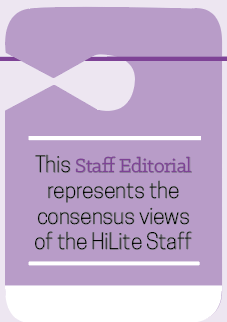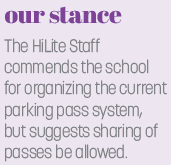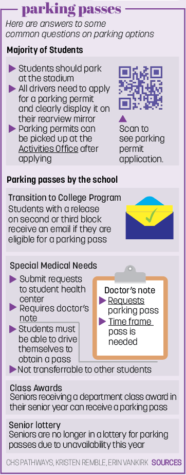In late September, the student services office distributed the remaining available parking passes by the school to applicable Transition to College Program (TCP) students. Questions of how many

were available and how they were assigned arose among students.
According to Rita Winters, secretary of student services, there are five categories for student parking passes at the top of the trail: medical, class awards, K-8 mentors, TCP and miscellaneous—whichincludes certain student government positions and activities. Only TCP students with second and third-block releases are eligible. Since there are allotted parking spots for K-8 mentors who leave school every Gold Day during third period, this limits the number of passes available on those days. Therefore, the system splits the semester in half—the first batch spans from the beginning of the semester to Oct. 18 while the second starts Oct. 19 and ends Dec. 20.
 Despite the myriad of complaints the student services staff receive on a regular basis, the HiLite staff commends them for all the effort they put into distributing such a limited number of passes to an overwhelmingly large student body. Although it seems that all driving students will never be satisfied until the trail from the stadium is turned into a moving walkway with a roof, we believe there is another possible system that student services should take into consideration.
Despite the myriad of complaints the student services staff receive on a regular basis, the HiLite staff commends them for all the effort they put into distributing such a limited number of passes to an overwhelmingly large student body. Although it seems that all driving students will never be satisfied until the trail from the stadium is turned into a moving walkway with a roof, we believe there is another possible system that student services should take into consideration.
An aspect the current parking system tends to ignore is the ability for students to share parking spaces. Many students carpool to school on a daily basis and if the option were available for more than one permit to be registered per parking spot, more students could take advantage of the opportunity. Many universities allow multiple vehicles to be registered under a single pass and a similar system could be implemented at this school. Similar to how seniors can sign up to share senior hallway lockers with a friend, eligible TCP students could register to share their parking spaces with another

designated student.
This does pose a new problem of multiple cars trying to park in the same spot if there’s miscommunication between students, but if both drivers are held accountable for parking violations—meaning both students would face the consequences regardless of which individual committed the violation—they would be more compliant to the regulations in order to keep their parking privileges. This shouldn’t be an issue as long as clear consequences are outlined and enforced the same way current regulations have always been.
We acknowledge the parking system is complicated and that it’s impossible to please the needs of every student, but by allowing students to share, more students would have the opportunity throughout the year to avoid the seven-minute trek up the trail and it would also encourage carpooling, which is better for the environment as well.

































![AI in films like "The Brutalist" is convenient, but shouldn’t take priority [opinion]](https://hilite.org/wp-content/uploads/2025/02/catherine-cover-1200x471.jpg)










































![Review: “The Immortal Soul Salvage Yard:” A criminally underrated poetry collection [MUSE]](https://hilite.org/wp-content/uploads/2025/03/71cju6TvqmL._AC_UF10001000_QL80_.jpg)
![Review: "Dog Man" is Unapologetically Chaotic [MUSE]](https://hilite.org/wp-content/uploads/2025/03/dogman-1200x700.jpg)
![Review: "Ne Zha 2": The WeChat family reunion I didn’t know I needed [MUSE]](https://hilite.org/wp-content/uploads/2025/03/unnamed-4.png)
![Review in Print: Maripaz Villar brings a delightfully unique style to the world of WEBTOON [MUSE]](https://hilite.org/wp-content/uploads/2023/12/maripazcover-1200x960.jpg)
![Review: “The Sword of Kaigen” is a masterpiece [MUSE]](https://hilite.org/wp-content/uploads/2023/11/Screenshot-2023-11-26-201051.png)
![Review: Gateron Oil Kings, great linear switches, okay price [MUSE]](https://hilite.org/wp-content/uploads/2023/11/Screenshot-2023-11-26-200553.png)
![Review: “A Haunting in Venice” is a significant improvement from other Agatha Christie adaptations [MUSE]](https://hilite.org/wp-content/uploads/2023/11/e7ee2938a6d422669771bce6d8088521.jpg)
![Review: A Thanksgiving story from elementary school, still just as interesting [MUSE]](https://hilite.org/wp-content/uploads/2023/11/Screenshot-2023-11-26-195514-987x1200.png)
![Review: "When I Fly Towards You", cute, uplifting youth drama [MUSE]](https://hilite.org/wp-content/uploads/2023/09/When-I-Fly-Towards-You-Chinese-drama.png)
![Postcards from Muse: Hawaii Travel Diary [MUSE]](https://hilite.org/wp-content/uploads/2023/09/My-project-1-1200x1200.jpg)
![Review: "Ladybug & Cat Noir: The Movie," departure from original show [MUSE]](https://hilite.org/wp-content/uploads/2023/09/Ladybug__Cat_Noir_-_The_Movie_poster.jpg)
![Review in Print: "Hidden Love" is the cute, uplifting drama everyone needs [MUSE]](https://hilite.org/wp-content/uploads/2023/09/hiddenlovecover-e1693597208225-1030x1200.png)
![Review in Print: "Heartstopper" is the heartwarming queer romance we all need [MUSE]](https://hilite.org/wp-content/uploads/2023/08/museheartstoppercover-1200x654.png)



